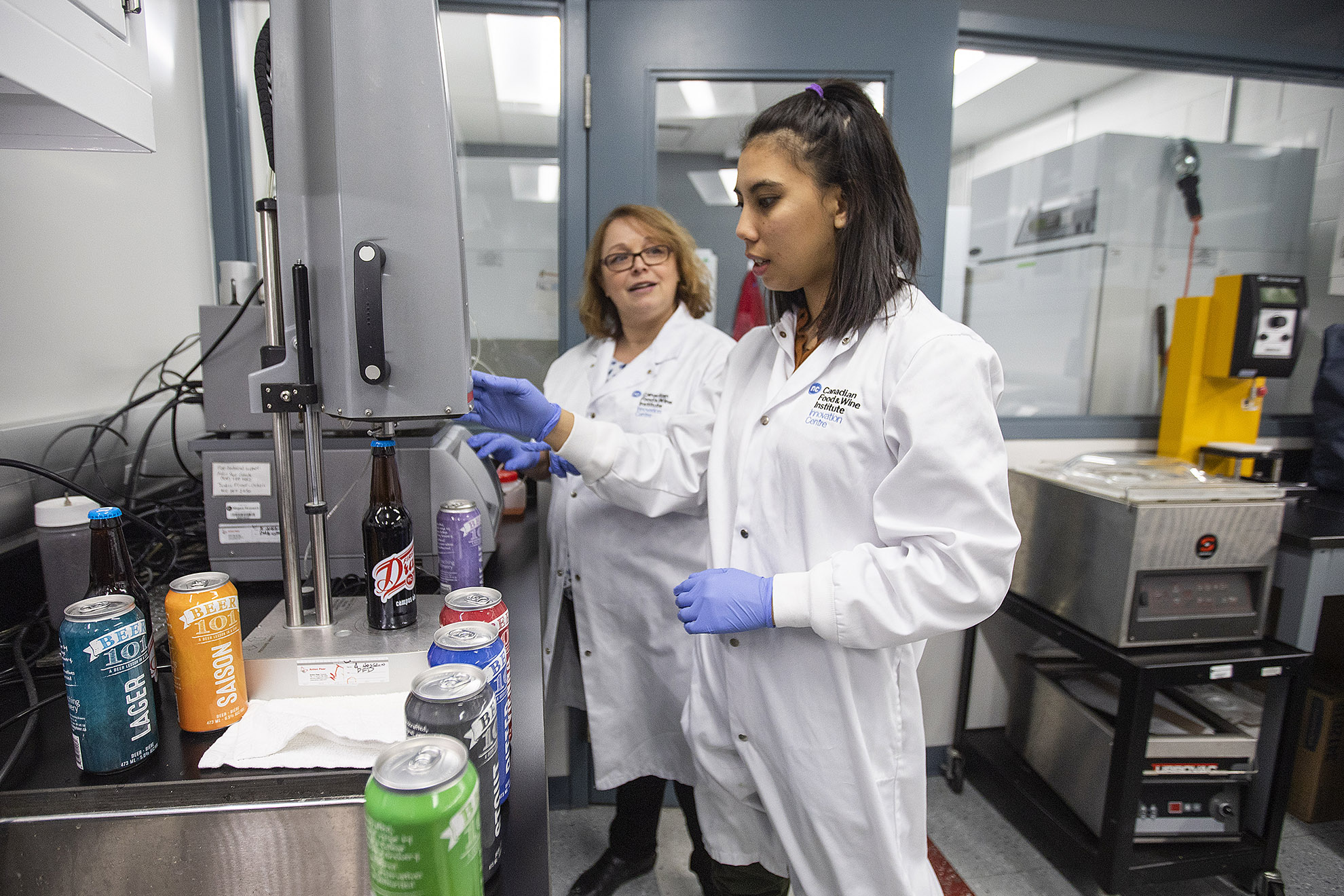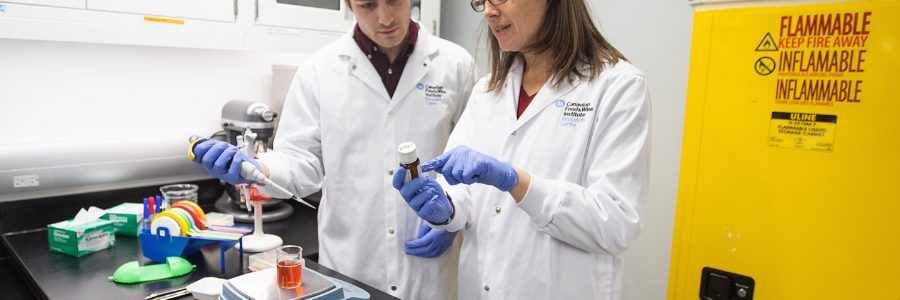Niagara College’s Research & Innovation division will be deploying more than $1 million to expand essential applied research in the growing beverage sector over the next three years, thanks to federal government funding.
The Natural Sciences and Engineering Research Council (NSERC) Innovation Enhancement Extend program will allow R&I’s Canadian Food & Wine Institute (CFWI) Innovation Centre to enhance its state-of-the-art commercialization services to assist more beverage companies in the Niagara region, and beyond, to innovate, grow and compete in the global marketplace.
The College and Community Innovation Program (CCIP) Extend Innovation Enhancement (IE) Grant, entitled ‘Increasing Economic Prosperity through Beverage Innovation & Commercialization,’ spans three years and includes $300,000 per year, to which $150,000 per year in industry cash contributions will be added for a total of $1.35 million.
The announcement is part of NSERC’s $76-million investment for 128 new applied research projects aimed at connecting Canadian colleges with local small- and medium-sized businesses to provide innovative solutions in the development of new products and technologies.
For the CFWI Innovation Centre, this grant means expanding resources to focus on feasibility studies (pre- and post-market services and risk assessments); beverage research and product development (innovative processes and incorporation of key market trends); consumer acceptance and quality assurance; and conducting research test-runs through a small-batch, scale-up beverage processing laboratory.
This funding responds to an incredible demand by regional beverage manufacturers, and more than six years of capacity building in food and beverage research and development at the CFWI Innovation Centre’s Technology Access Centre (TAC). The NSERC-funded TAC enables SMEs to advance their products, processes and services through access to specialized technology, equipment, and expertise.
“Beverage-sector companies have identified challenges that prevent them from innovating with new products, including a lack of affordable research expertise, equipment and facilities. Through this NSERC grant, we are able to better serve the needs of Ontario’s growing food and beverage industry,” said Marc Nantel, PhD, vice-president, Research, Innovation & Strategic Initiatives.
This initiative will establish the CFWI Innovation Centre as a Beverage Centre of Excellence, strengthening Niagara College’s track record of firsts in Canada as home of the first commercial Teaching Winery, Teaching Brewery, Teaching Distillery, and Commercial Cannabis Production academic program.
“Now we’re expanding this offering for our industry/training supports with a beverage and liquids R&D pilot processing lab that bridges the gap for companies looking to get consumable test-products in the market,” said Lyndon Ashton, centre manager, CFWI Innovation Centre.
When industry partner Royal Canadian Mead needed specialized expertise to develop a line of mead products, they looked to experts at the CFWI Innovation Centre. Together with NC’s Teaching Winery and Commercial Beekeeping program, College researchers crafted new styles of session brews, two of which are now on the shelves at the LCBO.
In a more recent innovative project with DistillX Beverages Inc., CFWI Innovation Centre researchers created Canada’s first distilled non-alcoholic gin, under the band label Sobrii Ø-Gin (zero gin), with zero calories, zero sugar and, as the marketing touts: zero hangovers.
“Their expertise was instrumental in terms of me being able to sell a product that was not only superior tasting but something I can commercially scale and replicate safely,” said Bob Huitema, founder of DistillX Beverages.
Since opening, the CFWI Innovation Centre has worked with companies of all sizes, including Bacardi Canada Inc., a subsidiary of Bacardi Ltd., the largest privately held spirits companies in the world. Consumer acceptance and sensory testing for Bacardi, involving students and staff experts, has informed the launch of new alcoholic beverage products.
Beyond project funding, this IE grant will allow the CFWI Innovation Centre to provide enhanced experiential learning opportunities for students, while meeting strong local industry demand for skilled talent. The Centre works with faculty experts and students from several NC programs – including Culinary Innovation and Food Technology (Co-op), Culinary Management (Co-op), Brewmaster and Brewery Operations Management, Winery and Viticulture Technician, and Wine Business Management programs – to provide a wealth of knowledge to industry partners.
“Our focus is on combining economic and workforce development aspects of our programs. This grant lets us hire students as research assistants, who work alongside highly-qualified experts and industry partners,” said Ashton. “It gives talent access to highly motivated employers in their field and acts as a proving ground for companies to tap into prospective employees by innovating.”
 NC’s award-winning Research & Innovation division provides real-world solutions for business, key industry sectors, and the community through applied research and knowledge transfer activities. Researchers conduct projects that provide innovative solutions, such as producing and testing prototypes, evaluating new technologies, and developing new or improved products or processes for small- and medium-sized businesses.
NC’s award-winning Research & Innovation division provides real-world solutions for business, key industry sectors, and the community through applied research and knowledge transfer activities. Researchers conduct projects that provide innovative solutions, such as producing and testing prototypes, evaluating new technologies, and developing new or improved products or processes for small- and medium-sized businesses.
Niagara College offers more than 130 diploma, bachelor degree and advanced level programs; as well as more than 600 credit, vocational and general interest Part-Time Studies courses. Areas of specialization include food and wine sciences, advanced technology, media, applied health and community safety, supported by unique learning enterprises in food, wine, beer, distilling, horticulture and esthetics. For more information visit niagaracollege.ca.
Photos:
Kelly Byer (left), a research laboratory technologist with the Canadian Food & Wine Institute Innovation Centre, and Samantha Stinellis (right), a research assistant with Research & Innovation and a graduate (2020) of NC’s Culinary Innovation and Food Technology program, conduct beverage research.
Kyler Schwind (left), a research assistant with Research & Innovation and a graduate (2020) of NC’s Culinary Innovation and Food Technology program, and Stephanie Skotidas (right), a research laboratory technician with the Canadian Food & Wine Institute Innovation Centre, conduct beverage research.
 Back to myNiagaraOnline
Back to myNiagaraOnline






















